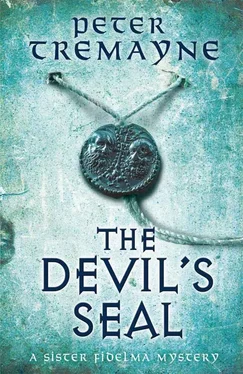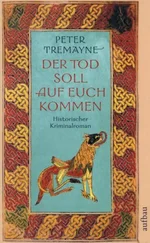Peter Tremayne - The Devil's seal
Здесь есть возможность читать онлайн «Peter Tremayne - The Devil's seal» весь текст электронной книги совершенно бесплатно (целиком полную версию без сокращений). В некоторых случаях можно слушать аудио, скачать через торрент в формате fb2 и присутствует краткое содержание. Год выпуска: 2014, ISBN: 2014, Издательство: Hachette UK, Жанр: Исторический детектив, на английском языке. Описание произведения, (предисловие) а так же отзывы посетителей доступны на портале библиотеки ЛибКат.
- Название:The Devil's seal
- Автор:
- Издательство:Hachette UK
- Жанр:
- Год:2014
- ISBN:9781472208330
- Рейтинг книги:3 / 5. Голосов: 1
-
Избранное:Добавить в избранное
- Отзывы:
-
Ваша оценка:
- 60
- 1
- 2
- 3
- 4
- 5
The Devil's seal: краткое содержание, описание и аннотация
Предлагаем к чтению аннотацию, описание, краткое содержание или предисловие (зависит от того, что написал сам автор книги «The Devil's seal»). Если вы не нашли необходимую информацию о книге — напишите в комментариях, мы постараемся отыскать её.
The Devil's seal — читать онлайн бесплатно полную книгу (весь текст) целиком
Ниже представлен текст книги, разбитый по страницам. Система сохранения места последней прочитанной страницы, позволяет с удобством читать онлайн бесплатно книгу «The Devil's seal», без необходимости каждый раз заново искать на чём Вы остановились. Поставьте закладку, и сможете в любой момент перейти на страницу, на которой закончили чтение.
Интервал:
Закладка:
Colgú shrugged. ‘If you think it worthwhile, then by all means do so. You should also persuade her that we have better guest facilities here than any lodging down in the township.’
Brehon Aillín intervened with another dry cough: ‘May I remind you that as your Chief Brehon, it is my duty to conduct all these enquiries.’
Colgú turned to the man with a look of irritation. ‘I was not overlooking that fact. But now you will be faced with more important tasks, for I wish you to liaise with Abbot Ségdae over the matter of this forthcoming deputation. That is a priority. The death of this religieux can be handled by Fidelma, as she is used to such matters.’
‘But. .’ Brehon Aillín began to object.
Colgú held up his hand to silence him. ‘I suggest that the sooner you consult with Abbot Ségdae, the better. Of course, if you hear anything that you think pertinent to Fidelma’s enquiry about Brother Cerdic, you will naturally inform her.’
The Brehon stared sullenly at the King for a moment and then, with a brief inclination of his head, turned and left.
There was a palpable relaxation between them as the door closed behind him.
‘I swear that man is getting more irascible each passing week,’ muttered Colgú, surprising them by his comment. It was not protocol for a King to criticise his Chief Brehon to others.
‘He is your Chief Brehon,’ Fidelma pointed out gently.
‘Yet not by choice,’ her brother reminded her.
It was true that Aillín had assumed the position by default when Áedo, the elected Chief Brehon of Muman, had been slain protecting King Colgú from an assassin only some months before. Aillín had been his Deputy only by reason of age and experience, and it had been felt, by the Council of Brehons, that he would soon retire and so being appointed Deputy Chief Brehon was a suitable acknowledgement for his service. Then Áedo had been killed. Aillín’s automatic appointment had been accepted in spite of his known prejudices, fastidious attitudes and pedantry. The delays caused by his concentration on unimportant details drove even Colgú to distraction.
The King now turned to Eadulf. ‘Do you have any ideas — about Brother Cerdic’s death, I mean?’
‘Only that I agree with Fidelma’s suggestion of having a further word with Abbess Líoch. It seems the only logical path now. Obviously, there must have been someone here in the palace who knew him well enough to have the motive to kill him.’
‘Why do you say that? Couldn’t a stranger have done this — someone who had a grudge to bear against the man’s race, or way of keeping the Faith? Don’t forget, many of our churchmen and their followers have recently been chased out of the kingdoms of the Angles and Saxons after the decision at Streonshalh to follow the ways of Rome. . Why, even some of the Angles and Saxons have sought liberty to follow their Faith by coming here — for example, Brother Berrihert and his companions who have settled in Eatharlach.’
‘A good point,’ agreed Eadulf. ‘But Brother Cerdic knew his attacker. I don’t think it was random.’
‘What is your reason for saying so?’ queried Colgú.
‘Because Brother Cerdic was not suspicious of his attacker. He allowed whoever it was to come close enough in order to inflict those two mortal wounds. The victim did not suspect what was going to happen. He died without a sound or protest.’
‘That’s a reasonable deduction,’ Fidelma commented.
Colgú suppressed a sigh. ‘Then follow your thoughts by all means. It would be good if we could resolve this matter before Bishop Arwald and his companions arrive. I do not want other distractions clouding whatever is behind the reason of their coming.’
‘We’ll do our best to resolve things. Don’t worry,’ Eadulf replied, rising.
Fidelma rose with Eadulf and moved towards the door. She was opening it when Colgú called after them: ‘ Post equitem sedet atra cura .’
Outside, Eadulf said: ‘I didn’t catch the meaning of that.’
‘It was from an ode by Horace,’ Fidelma explained with a brief smile. ‘Behind the horseman sits black care.’
‘Even a king is not free from worry,’ Eadulf re-interpreted philosophically. ‘I must confess, there seems much to concern him.’
They collected their horses from the stables, rode across the courtyard and approached the main gates. The commander of the guard, a warrior called Luan, greeted them with a respectful salute.
‘We are just going into the township, Luan,’ Fidelma said. ‘If anyone enquires, we shall not be long.’
‘Where will you be, lady?’
‘We are going to find the lodgings of Abbess Líoch.’
‘But you have just missed her, lady.’
Fidelma exchanged a quick glance of surprise with Eadulf. ‘What do you mean, just missed her?’ she asked.
The warrior shrugged. ‘She and her companion have only just left the palace. Why, you will overtake her on her way back to the township as they are both on foot.’
Fidelma knew Luan had been at the gates when she had arrived after her morning ride with little Alchú. But she had left her friend, Líoch, and the abbess’ companion at the track leading into the township which sprawled on the southern side of the great limestone rock on whose top the palace of her brother rose. She restrained herself from asking Luan if he was sure. He would not have said so, otherwise.
‘When did the abbess arrive?’ she asked.
‘Shortly after you did, lady,’ replied the man. ‘You were talking with friend Eadulf in the courtyard and then you parted. It was just after that they arrived.’
Fidelma said thoughtfully, ‘She must have changed her mind about going into the town and followed us.’
‘But Luan has just said that she and her companion were on foot,’ Eadulf reminded her. ‘Didn’t you say that they were on horseback?’
Fidelma turned back to Luan. ‘You did say that the abbess and her companion arrived on foot?’
‘I did, lady,’ confirmed the warrior.
‘Another mystery,’ Eadulf muttered, almost to himself.
‘But one we can easily resolve,’ replied Fidelma, urging her horse forward through the gates.
They overtook Abbess Líoch and her companion as the women were crossing the market square of the township. They were not on foot but on horseback. As Fidelma called to her friend, the abbess turned her head and then drew rein while her companion followed suit.
‘Líoch!’ greeted Fidelma, as they rode up. ‘We missed you at the palace.’
Eadulf wondered if he had mistaken a nervous exchange of glances between the abbess and her companion, but nothing was said.
‘My brother insists that you accept the hospitality of our guest quarters and will take “no” as a personal insult,’ went on Fidelma pleasantly. Then, before the abbess could respond, Fidelma indicated Eadulf. ‘By the way, this is Eadulf, of whom you have heard me speak. Eadulf, this is Abbess Líoch of Cill Náile.’
Eadulf inclined his head in greeting. ‘I have often heard Fidelma speak of you, Abbess.’
Abbess Líoch returned his greeting with a quick scrutiny but said nothing. Eadulf could see why little Alchú had described her as ‘strange’. She was not much older than Fidelma but with dark eyebrows and deep-set, dark eyes. The features were attractive although plump; the cheeks rosy, the lips full and red without the necessity for highlighting them with berry juice. However, as Fidelma had described her, the abbess was clad in black robes from poll to feet. It was unusual dress for the country, although he had seen similar costumes worn among the elderly in Rome.
‘I am sorry. I have forgotten your name, Sister.’ Fidelma turned brightly to Abbess Líoch’s companion, ignoring the silence which greeted them.
Читать дальшеИнтервал:
Закладка:
Похожие книги на «The Devil's seal»
Представляем Вашему вниманию похожие книги на «The Devil's seal» списком для выбора. Мы отобрали схожую по названию и смыслу литературу в надежде предоставить читателям больше вариантов отыскать новые, интересные, ещё непрочитанные произведения.
Обсуждение, отзывы о книге «The Devil's seal» и просто собственные мнения читателей. Оставьте ваши комментарии, напишите, что Вы думаете о произведении, его смысле или главных героях. Укажите что конкретно понравилось, а что нет, и почему Вы так считаете.











